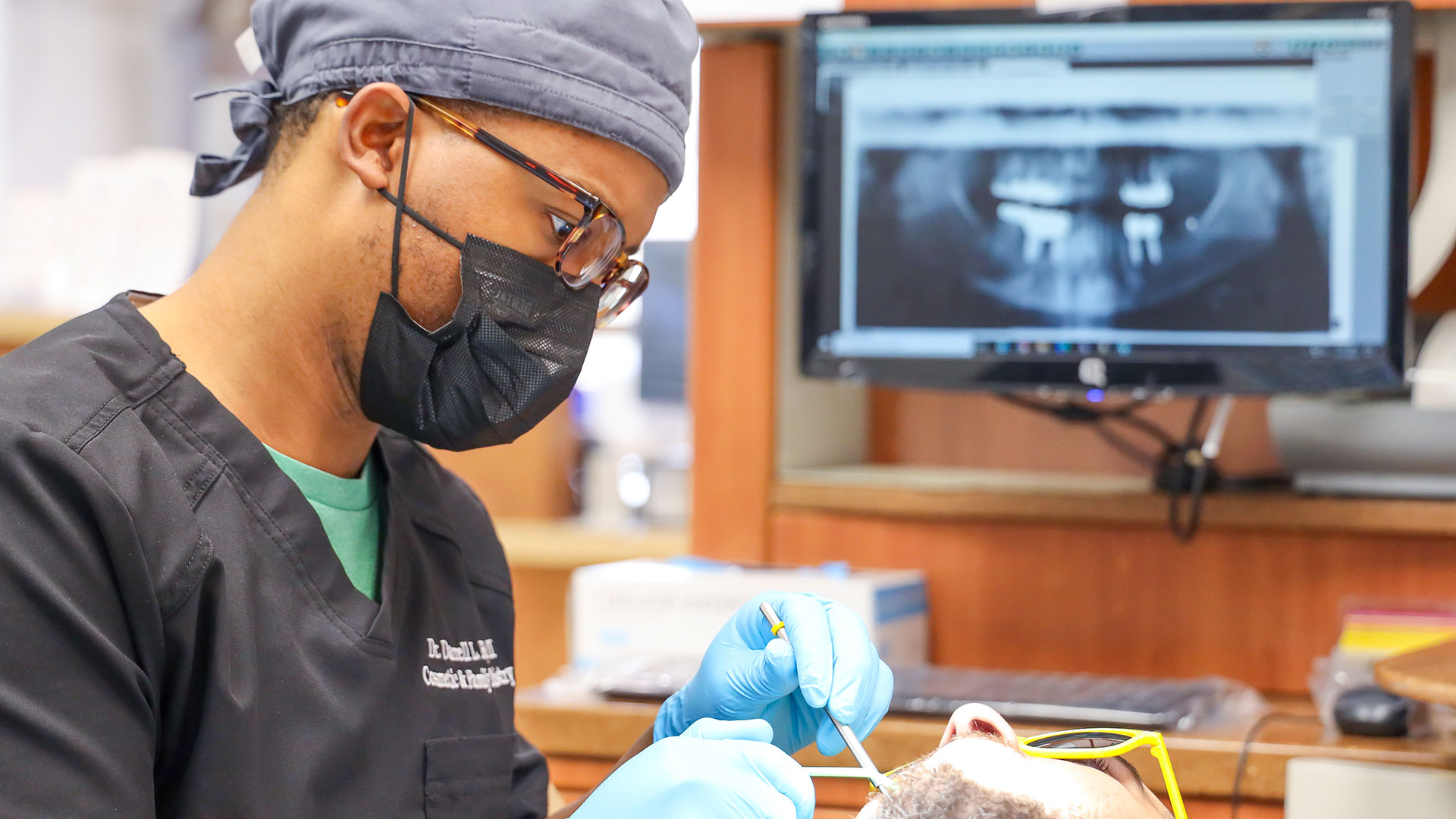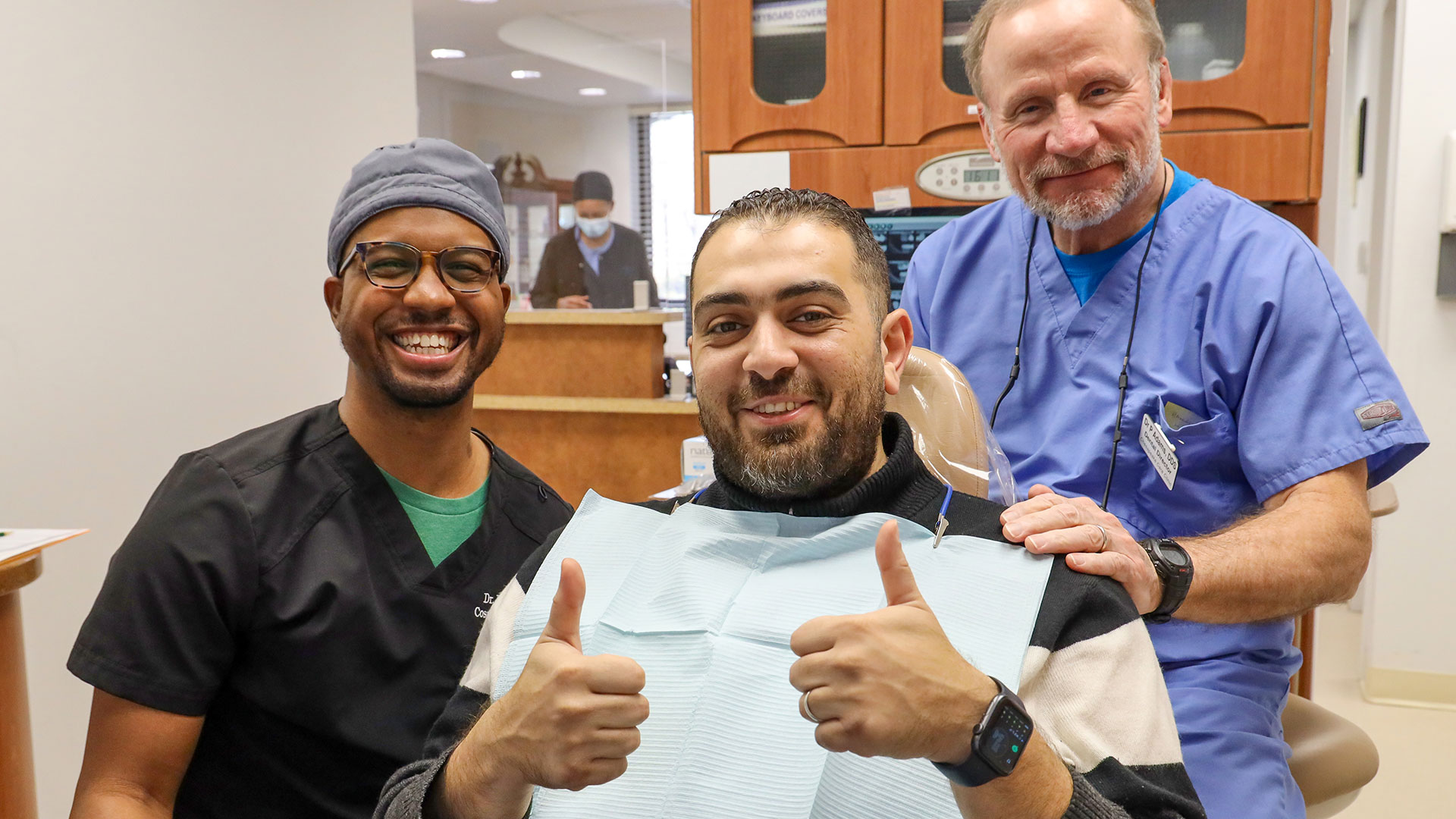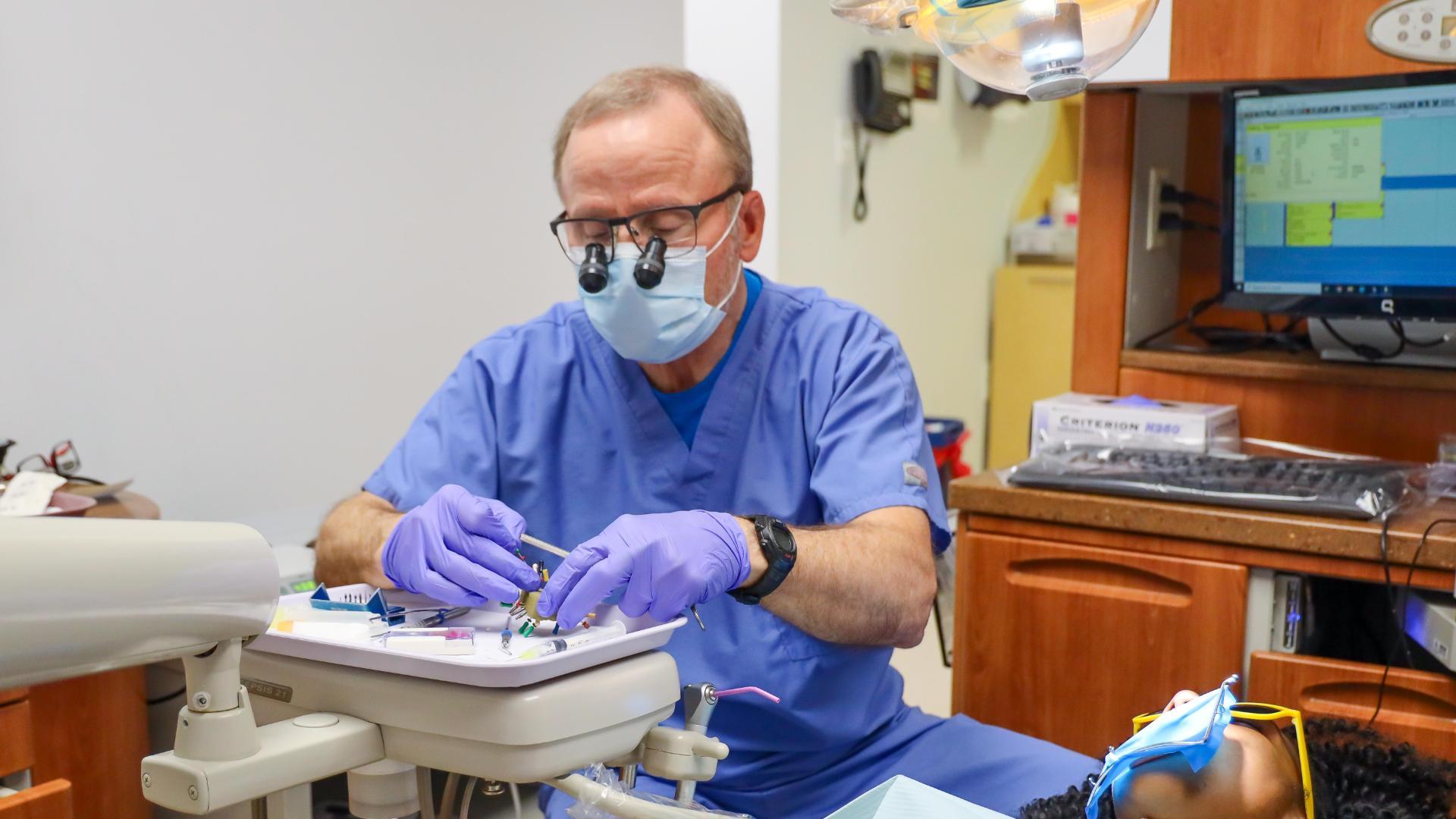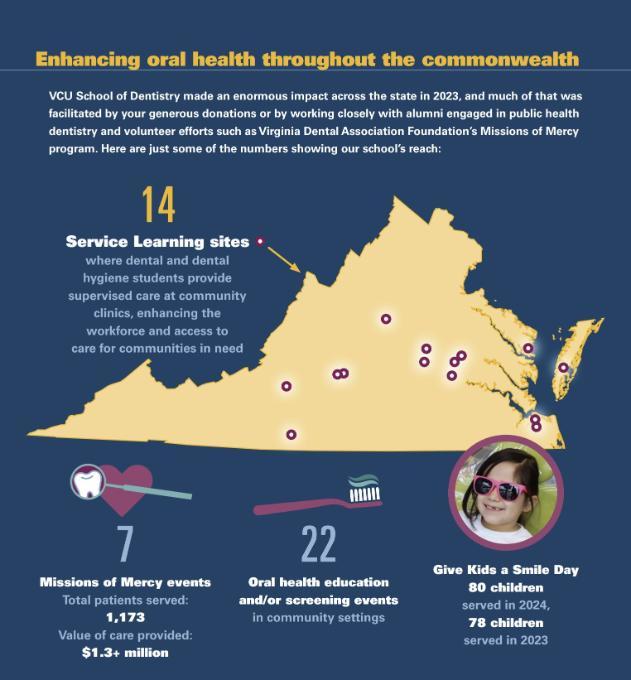 Dr. Darrell Boyce (D.D.S. ’23), who graduated in 2023, saw patients throughout the state during his external rotations for VCU. Now, Boyce volunteers at Chesapeake Care Clinic, proctoring VCU dental students engaged in their own external rotations
Dr. Darrell Boyce (D.D.S. ’23), who graduated in 2023, saw patients throughout the state during his external rotations for VCU. Now, Boyce volunteers at Chesapeake Care Clinic, proctoring VCU dental students engaged in their own external rotationsLearning through service at Chesapeake Care Clinic
This article was originally featured in the spring 2024 edition of Dentistry magazine, published by the school’s Communications Department.
Shortly after getting a root canal at the Chesapeake Care Clinic this past January, Zipporah Gatling says she’s feeling numb — and very fortunate.
Gatling says that without the nonprofit clinic, which cares for uninsured patients like her, she’s not sure if she’d be able to find affordable dental care. The clinic’s bill for the root canal is about one-third of the $1,500 the Suffolk resident would have had to pay out of pocket for the procedure at a private practice.
“Without health insurance, it’s very hard to get care,” said Gatling, a 29-year-old school teacher working as a contractor without health or dental insurance. “The fact this clinic is here is godsent for the situation I’m in right now. It’s a blessing, and I’m really thankful that it’s here and that it’s affordable.”
And under a partnership with the VCU School of Dentistry, the Chesapeake clinic provides greatly expanded care to the community. Through the school’s Service Learning Program, senior VCU dental and dental hygiene students gain real-world experience while providing much-needed oral health care to people who might struggle to access it elsewhere.
The Chesapeake clinic is one of 14 Federally Qualified Health Centers (FQHC) or charitable clinics around Virginia where VCU School of Dentistry students are required to serve on external rotations. Some of the services they provide include cleaning teeth, filling cavities, tooth extractions and providing education on hygiene practices that improves the oral health of uninsured and underserved patients.
Under supervision from dentists with affiliate relationships with the school, VCU students are providing dental care for patients living in places like Martinsville in Southwest Virginia, Franktown on Virginia’s Eastern Shore, and Norfolk in Hampton Roads.
Dr. Darrell Boyce (D.D.S. ’23), who graduated last year, saw patients throughout the state during his external rotations for VCU.

“I went to Lynchburg and Roanoke, and the dental needs for those areas were completely different from Richmond,” said Boyce. “In Lynchburg, I did a lot of extractions as compared to Richmond, where I would do a lot of restorative care. It allows you to ask, ‘with all these extractions, is it because of gum disease? Is it because of oral hygiene?’ Then you think, ‘how can I prevent that?’”
During their rotations, the students learn firsthand the needs of the communities they serve. This often motivates them to become engaged in improving access to care. Many participate in advocacy during and after school to improve public policies promoting oral health. Others end up working in FQHCs or volunteering at events that provide charitable care.
Now, Boyce volunteers at Chesapeake Care Clinic, proctoring VCU dental students engaged in their own external rotations. He and the students consult X-rays and go through pre-procedure checks before the students perform procedures. The Service Learning Program, Boyce says, offers his former classmates a real-world opportunity to apply what they’ve learned in their training at VCU.
“I know they know exactly what to do, so it’s pretty awesome to see that,” said Boyce.
Dr. Peter Adams (D.D.S. ’86), dental director at Chesapeake Care Clinic, particularly appreciates the contributions of his alma mater in helping deliver care in the community. After earning his dental degree from VCU, Adams went into the U.S. Navy Dental Corps and then private practice before joining the clinic.
“I’m very proud of VCU coming down here and helping us,” said Adams. “Having VCU students come down and see all these patients — everybody wins. The students win. The community wins. The clinic wins.”

Sitting in his clinic office, Adams could quantify the impact VCU was having on community care by simply glancing at the clinic’s upcoming schedule of appointments. Three VCU dental students were expected to see a dozen patients on an upcoming Friday.
“That’s 12 people getting tooth extractions, or one to two fillings, for $30 per patient,” said Adams. “Without those VCU students, I would have to do that. And I’m just one person here two days a week. I’d be booked out for months. Maybe something that might need a filling now will require an extraction or a root canal in several months.”
Without Chesapeake Care Clinic, many people would be faced with few options. Often, patients who go to a hospital emergency room with tooth pain are simply medicated and referred to an oral surgeon.
“That’s expensive for the emergency room and expensive for the patient,” said Adams. “It’s often difficult for them to pay the fees of an oral surgeon.”
This leads many to simply forgo care, causing health problems to snowball and often spill over into other parts of their lives. When it becomes too much to bear, difficult choices are often made.
“They may not make a car payment. They may not be able to make a rent payment,” said Adams. “Too often, they will have to go into debt or miss other payments to receive the care they need.”
Annually, the clinic sees approximately 2,000 patients, and VCU dental and dental hygienist students treat more than half of them, Adams estimates.
Among them is Yousif, a 38-year-old Virginia Beach resident who stopped by in January for teeth cleaning. Yousif, who preferred to only share his first name, has had his share of dental issues — including implant procedures performed at the VCU School of Dentistry in Richmond. Yousif, who doesn’t have insurance, works in Chesapeake. His entire family relies on the nonprofit clinic to provide dental care closer to home.
“They take care of us here,” said Yousif. “They’re so kind, very friendly with us. When you have something closer, it’s better for you.”
For Boyce, who treated Yousif during his visit, volunteering at the Chesapeake Care Clinic is a bit of a homecoming. Boyce grew up in the community and volunteered at the clinic before he enrolled at the VCU School of Dentistry. He now practices alongside his father at Boyce Family Dentistry in Chesapeake.
“We learned a lot in Richmond,” said Boyce. “It’s great to apply that to address the needs of our community.”
